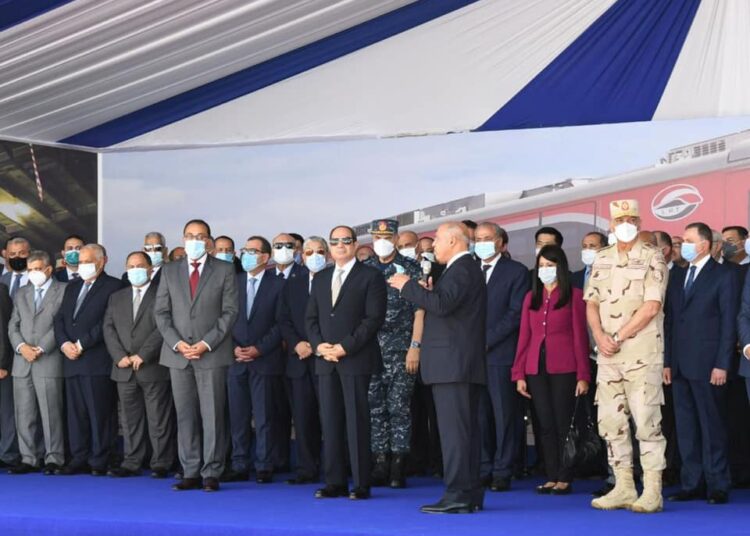Egyptian Finance Minister Mohamed Maeet said that Egypt’s economy is more capable than ever of facing challenges posed by the international developments and meeting the aspirations of the Egyptian people.
During President Abdel Fattah El Sisi’s tour of Alexandria Port on Tuesday, the finance minister said that the customs system stimulates the Egyptian economy.
Maeet further noted that President Sisi stressed the necessity of the governance of customs procedures, facilitating trade and reducing the time needed for customs to grant clearance of goods.
The finance minister spoke of the Single Window System, which is an electronic system that connects all customs outlets to one system.
He further noted that the Egyptian company for e-commerce technology was also established in partnership with the private sector to implement the single-window system.
In April, Egypt launched the National Single Window for Foreign Trade Facilitation (Nafeza) system.
The initiative is implemented by the Egyptian Customs Authority to modernise and automate customs administration, simplify procedures and reduce clearance times.
The finance minister said that a project is underway to facilitate international trade procedures to enhance Egypt’s direct access to regional and international markets.
The project is carried out in co-operation with the International Finance Corporation (IFC), a sister organisation of the World Bank and member of the World Bank Group, the minister added.
He further noted that central labs will be set up in all ports to expedite the finalisation of inspection procedures and the release of goods.
Meanwhile, Minister of Transport Kamel el-Wazir said that the Egyptian government is working to upgrade Alexandria Port to become an international trade and logistics hub.
Accompanying President Sisi on a visit to the port, Minister Wazir said that the upgrade process should be completed by the end of 2024.
This, he added, is meant to create transport hubs linking sea and dry ports and logistics areas. One such hub is the Sokhna-Alexandria corridor, the minister noted.
Wazir touched upon a plan outlined to upgrade and integrate all the transport sectors, starting from ports and then multimodal or combined transport.
He said his ministry seeks to establish new docks over 35 kilometres, so that the total length is 73 kilometres. This, Wazir added, would help accommodate some 370 million tonnes of cargo per year up from an annual of 185 million tonnes now.
The minister also talked about a plan to build seven kilometres of highways and major roads, so that the total length of the road network reaches 30,000 kilometres. Part of the plan also includes the establishment of 22 corridors and a bridge over the Nile, he noted.
The Transport Ministry is acting to establish 1,000 new flyovers and tunnels to further expand an existing network of 1,500, Wazir said.
The minister also pointed out a plan to bring the railway sector up to code through establishing an electric train network over 2,000 kilometres.
This should go hand in hand with efforts to renovate existing train lines, Wazir said, adding the goal is to have a total of 12,000 kilometres of railways in Egypt to be able to transport some two million passengers daily instead of one million.
The expansion in railways will also contribute to an increase in the amount of transported cargo from 4.5 million tonnes annually to 13 million, he further said.
Three new river ports have already been built as part of the all-out transport plan, under which eight new dry ports and five new logistics zones were also established with the aim to accommodate five million container ships annually, the minister added.
The Transport Ministry has also upgraded seven land ports on all Egyptian borders, Wazir noted.






Discussion about this post